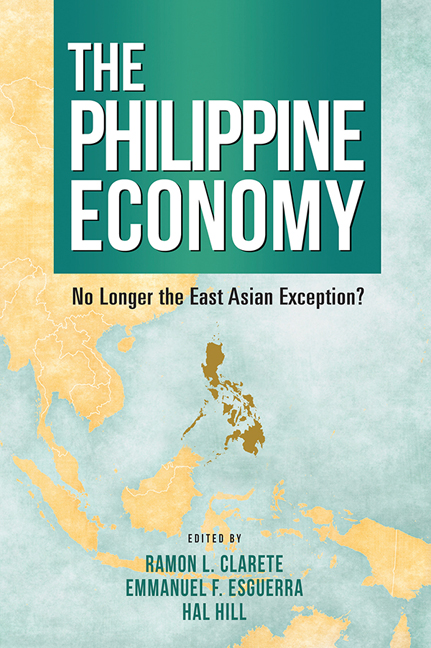Book contents
- Frontmatter
- Contents
- List of Figures
- List of Tables
- Foreword by Arsenio M. Balisacan
- Preface
- About the Contributors
- 1 The Philippine Economy: An Overview
- 2 Economic Growth and Poverty Reduction
- 3 Infrastructure and Urbanization
- 4 Education and Training
- 5 Universal Health Coverage, Health Security and Resilient Health Systems
- 6 Environmental Resources, Shocks and National Well-Being
- 7 Energy: Power Security and Competitiveness
- 8 Development Finance
- 9 Governance and Institutions
- Index
Preface
Published online by Cambridge University Press: 12 February 2019
- Frontmatter
- Contents
- List of Figures
- List of Tables
- Foreword by Arsenio M. Balisacan
- Preface
- About the Contributors
- 1 The Philippine Economy: An Overview
- 2 Economic Growth and Poverty Reduction
- 3 Infrastructure and Urbanization
- 4 Education and Training
- 5 Universal Health Coverage, Health Security and Resilient Health Systems
- 6 Environmental Resources, Shocks and National Well-Being
- 7 Energy: Power Security and Competitiveness
- 8 Development Finance
- 9 Governance and Institutions
- Index
Summary
It is a pleasure to thank the many people and institutions who contributed generously to this volume, and without whom it would not have seen the light of day.
First and foremost, we would like to express our deep gratitude to our good friend and colleague, Arsenio M. Balisacan, and his staff, for initiating this project during his term as Secretary of Socioeconomic Planning and Director General of the National Economic and Development Authority (NEDA) in the Government of the Philippines from 2012 to 2016. As he explains in the Foreword written for this volume, he and his senior colleagues in government oversaw a period of strong economic growth. But they were also conscious of the importance of maintaining the momentum. To this end, they set to work on crafting a forward-looking agenda, Ambisyon Natin 2040, which articulated a vision for an inclusive and prosperous Philippines. Some of the works commissioned for this endeavor provided the germ for the analytical papers that fed into this volume.
The Asian Development Bank (ADB) played a crucial supporting role in facilitating work on this project, including a workshop at which draft papers were presented and discussed. We are most grateful to the staff of the Bank's Philippine Country Office, headed by Richard Bolt, for their enthusiastic support and wise counsel.
While thankful to NEDA and the ADB, we do wish to emphasize that the views and assessments in this volume are those of the contributors and editors alone, and should not be attributed to these two supporting institutions.
We are most grateful to our contributors for taking time out from their busy schedules to write stimulating papers, and to cheerfully endure the protracted editorial processes leading up to publication.
We thank Mr Ng Kok Kiong, Mr Stephen Logan and the ISEAS publishing team for their interest in our work, and an anonymous referee for very helpful and constructive comments on an earlier draft.
The current period is arguably one of the most significant in Philippine history. The country is frequently in the international news headlines, perhaps more than it would like to be. Behind these headlines is the question of whether the momentum of recent economic growth in the country can be sustained and its dividends enjoyed by more of the population.
- Type
- Chapter
- Information
- The Philippine EconomyNo Longer The East Asian Exception?, pp. xxv - xxviPublisher: ISEAS–Yusof Ishak InstitutePrint publication year: 2018

